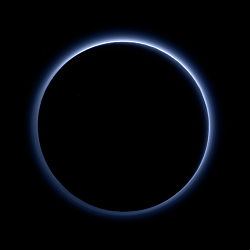
Back الغلاف الجوي لبلوتو Arabic Atmósfera de Plutón Spanish Pluuto atmosfäär Estonian Atmosphère de Pluton French Atmosfera di Plutone Italian Атмосфера на Плутон Macedonian Atmosfera Plutona Polish Atmosfera de Plutão Portuguese Атмосфера Плутона Russian Плутонова атмосфера Serbian
 Departure shot of Pluto by New Horizons, showing Pluto's atmosphere backlit by the Sun. The blue color is close to what a human eye would have seen, and is caused by layers of haze in the atmosphere | |
| General information | |
|---|---|
| Height | ~1 700 km (exobase)[1] |
| Average surface pressure | 1.0 Pa (9.87×10−6 atm) (2015)[2] 0.91 Pa (8.98×10−6 atm) (2020)[3] |
| Composition[a] | |
| Nitrogen (N 2) | >99% |
| Methane (CH 4) | 0.25% |
| Carbon monoxide (CO) | ~0.0515% |
| Acetylene (C 2H 2) | 0.0003% |
| Ethylene (C 2H 4) | 0.0001% |
| Hydrogen cyanide (HCN) | 10-5-10-6% |
The atmosphere of Pluto is the layer of gasses that surround the dwarf planet Pluto. It consists mainly of nitrogen (N2), with minor amounts of methane (CH4) and carbon monoxide (CO), all of which are vaporized from surface ices on Pluto's surface. It contains layered haze, probably consisting of heavier compounds which form from these gases due to high-energy radiation. The atmosphere of Pluto is notable for its strong and not completely understood seasonal changes caused by peculiarities of the orbital and axial rotation of Pluto.[6]
The surface pressure of the atmosphere of Pluto, measured by New Horizons in 2015, is about 1 Pa (10 μbar), roughly 1/100,000 of Earth's atmospheric pressure. The temperature on the surface is 40 to 60 K (−230 to −210 °C),[6] but it quickly rises with altitude due to a methane-generated greenhouse effect. Near the altitude of 30 km it reaches 110 K (−163 °C), where it then slowly decreases afterwards with height.[7]
Pluto is the only trans-Neptunian object with a known atmosphere.[7] Its closest analog is the atmosphere of Triton, although in some aspects it resembles even the atmosphere of Mars.[8][9]
The atmosphere of Pluto has been studied since the 1980s by way of earth-based observation of occultations of stars by Pluto[10][11] and spectroscopy.[12] In 2015, it was studied from a close distance by the spacecraft New Horizons.[4][2]
- ^ Cite error: The named reference
Strobel2017was invoked but never defined (see the help page). - ^ a b Cite error: The named reference
Gladstone_2016was invoked but never defined (see the help page). - ^ Cite error: The named reference
Farahani2021was invoked but never defined (see the help page). - ^ a b Cite error: The named reference
Stern_2015was invoked but never defined (see the help page). - ^ Cite error: The named reference
Lellouch_2017was invoked but never defined (see the help page). - ^ a b Cite error: The named reference
Stern_2014was invoked but never defined (see the help page). - ^ a b Cite error: The named reference
Dias_Oliveira_2015was invoked but never defined (see the help page). - ^ Cite error: The named reference
Lellouch_2015was invoked but never defined (see the help page). - ^ Cite error: The named reference
Johnston_2006was invoked but never defined (see the help page). - ^ Cite error: The named reference
Elliot_2007was invoked but never defined (see the help page). - ^ Cite error: The named reference
Olkin_2015was invoked but never defined (see the help page). - ^ Cite error: The named reference
Yelle_1997was invoked but never defined (see the help page).
Cite error: There are <ref group=lower-alpha> tags or {{efn}} templates on this page, but the references will not show without a {{reflist|group=lower-alpha}} template or {{notelist}} template (see the help page).